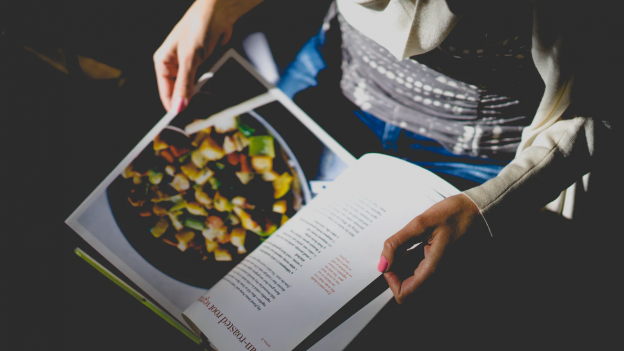Let’s say you’ve created a scrumptious recipe that is uniquely yours. You haven’t seen it on the Food Network and it’s not something you read on a restaurant menu – it’s your own invention. You might feel the need to protect it. Securing legal protection for a recipe isn’t an easy-as-1-2-3 process- there are some formalities to consider. With that said, we’ll take a look at the different forms of legal protection and whether a recipe qualifies for them or not.
As a quick side note, we want to remind you that we are not legal experts ourselves and the information we’re sharing is based on the research of intellectual property laws.
4 Levels of Legal Protection for Cookbook Publishers to Know
A cold hard truth in the culinary world is that no one truly owns a recipe. At some point, if a recipe becomes famous, other cooks and chefs will emulate it or at least draw inspiration from it. That’s how beginner chefs learn their craft and how more experienced ones expand their culinary repertoire.
With that said, there are certain instances where a chef or cook should protect their creation when they have the legal right to do so. Whatever the occasion, the recipe’s legal status will have to somehow qualify for one of four types of intellectual property terms – copyright, patent, trademark and trade secrets.
Copyright
The purpose of copyright law is to protect the creators and authors of original works, whether that work is a musical composition, literary work or some other form of creation.
Recipes themselves are not protected by copyright. Yes, they might contain your own unique blend of ingredients or feature an innovative cooking method, but you don’t own the names of food ingredients or cooking techniques. For example, ingredients such as “1 tbsp of butter” or “bake at 375 degrees Fahrenheit” are facts and instructions. They’re considered utilitarian information that is freely available to the public, and you can’t own them.
But there is some good news. After you publish a cookbook, copyright law can protect you if your food preparations incorporate highly creative concepts. In other words, if you are naming them, artfully designing them or creating them in collaboration with another brand or an event, you might be able to obtain a copyright for your work.
One example of this is Caitilin Freeman’s Mondrian cake and her cookbook, Modern Art Desserts. The cakes were created for the Blue Bottle Coffee at the San Francisco Museum of Modern Art, and featured intricate design patterns reminiscent of artistic masterpieces. She was most certainly able to obtain a copyright for her cookbook.
Patent
The purpose of a patent is to protect an invention that solves technical problems. In the culinary world, a patent may provide more value than copyright if you’ve created a new tool, method or formula as that would fall under the category of “invention”.
However, there are some ground rules that chefs need to know before seeking a patent. The invention must be the first of its kind, unknown to the rest of the world. Also, the form this invention takes needs consideration as well. A new mechanical tool will most likely have no issue getting a patent. A new substance may be eligible for a chemical patent. A new recipe, on its own, would likely not get considered.
Of course, if your recipe has some sort of zany new chemical composition, then it may qualify for a chemical patent. The greater likelihood though is that it may qualify for a trade secret (more on this below). Again, simply arranging a new way to combine ingredients is viewed as public knowledge, and therefore, not up for patent consideration.
Trademark
Trademark law protects brand names, logos, taglines/slogans and catchphrases. Every famous food tagline you can think of such as McDonald’s “I’m Lovin’ It” and Burger King’s “Have It Your Way”, are trademarked expressions. It can also protect a food brand’s packaging and the appearance/shape of its food from being stolen. For example, the Coca Cola bottle is trademarked for its iconic shape.
Ultimately, a trademark is geared towards protecting brand assets behind a food product, as opposed to its recipe. This may seem like a disadvantage for the average cook or chef, but for those who own restaurants, this is great news. Not only will trademark law protect your restaurant name, logo and slogan (if you have one), it can protect the creative names of meals on your menu.
Keep in mind too, that if you want to create a recipe book, for commercial purposes, the name of that book can be submitted for a trademark.
Trade Secrets
You’ve probably noticed a recurring theme here – the law doesn’t protect recipes themselves. They offer protection for the works they appear in, such as a cookbook, or the food products they’re used in. However, there’s another form of legal protection that chefs and cooks may want to consider – trade secrets.
A trade secret is essentially a form of information that is only known by its owner or creator, which usually gives them a competitive advantage. Many recipes for food and drinks are trade secrets – Coca Cola’s ingredient base, KFC batter and more. Essentially, their unique combination of ingredients will not be shared with the public.
When a recipe qualifies as a trade secret, the creator can rest assured that its ingredients will never be revealed. There is one caveat here: a recipe that’s considered a trade secret can’t appear in a cookbook because its ingredients must remain hidden to retain its status.
Should Cookbook Publishers Protect Their Recipes?
There’s no right or wrong answer to this question. It simply depends on what a chef or a cook is looking to protect and for what purpose. Let’s summarize what we’ve discussed above.
Copyright law protects actual works of authorship such as a cookbook but not recipes themselves. A patent protects inventions that solve technical problems (ie. a new type of kitchen utensil), while trademarks protect a brand’s identity (ie. Kelloggs, The Keg’s logo, KFC recipes). Trade secrets, however, can protect a recipe as long as the ingredients of that recipe are never revealed.
If you are looking to create a recipe book, especially for commercial use, then you might want to consider copyright. A trade secret can protect your recipe from being stolen, but that would mean you couldn’t put it in your cookbook because its ingredients would then be public knowledge.
With all that said, your final decision should also come from the insights of a lawyer. They will help you determine what the best course of action is along with alternatives if a certain form of intellectual property doesn’t work for you.
Are you looking to create a recipe book but have no idea where to start? Take a look at our resources page to help you find recipes and other inspirations for your culinary creations!

